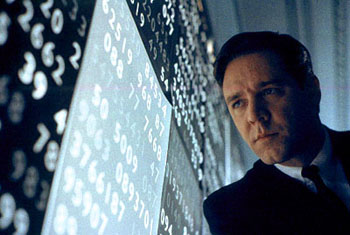Russell Crowe stars as John Forbes Nash Jr., who we meet as he arrives to Princeton University in 1947, a poor young man whose remarkable skills in mathematics won him a scholarship. He doesn’t really fit in with the other students though, and he has no interest in actually going to classes. He just wants to find a truly original theory, to think of something that will matter. Something that will make him matter. He does calculate some brilliant stuff, which opens up opportunities for him, all the way to a code breaking gig at the Pentagon, but something is tearing him loose : schizophrenia. Combined with Cold War-era conspiracy theories paranoia, this might make him go totally insane. All he’s got left is his caring wife Alicia (Jennifer Connelly), and even she is tempted to give up on him.
It’s taken me a while to process my feelings on Ron Howard’s latest film, as they’re kind of confused. In short, I thought the first act was mediocre, then the film did something I perceived as a cheat, but finally it redeemed itself in its powerful last hour. So how am I supposed to review the whole film, as I found its first half to be generic and maudlin, but by the end I was moved to tears? Well, let’s start at the beginning, or the “Good Will Hunting” part. These early scenes aren’t that bad, they’re just bland and harmless. Nash is somehow interesting already, with subtle hints of personality troubles, but he’s surrounded by walking clichés, like the snobbish daddy’s boy (Josh Lucas), the wisecracking buddies, the kind old teacher, or a newer obligatory staple (see also : “Notting Hill”, “Undeclared”), the quirky British roommate (Paul Bettany). Plus, it’s all so timid, a little joke here, a little touching moment there. Yawn.
Another thing that bothered me was the seemingly random, unnatural pacing. It’s the first day of the semester, then wham!, it’s six months down the line, boom!, Nash’s made his discovery, watch out! It’s now five years later and he’s called in to break some Soviet code. It gets even more frustrating when Nash starts teaching and Alicia, who’s his student, catches his eye. It literally goes from ‘what’s your name’ to ‘I find you attractive’ to ‘will you marry me?’ to ‘you’re pregnant?!’ Meanwhile, Nash, is recruited by a Secretary of Defence agent (Ed Harris) who wants him to peruse periodicals to look for secret Communist codes. Come again? That’s not all, there’s tense dropouts, mysterious men in black, chases, shoot-outs. It makes little sense, and it’s hardly all that interesting. I was ready to pan the film.
Oh, but wait a second there, that’s only the first hour or so of the film, before what I called the big cheat. Don’t worry, I’m not gonna spoil it. Let’s just say that the film reveals that it isn’t really concerned with code cracking or Nash’ love life; “A Beautiful Mind” is ultimately about one man’s struggle to retain his sanity, to sort out his mind at once capable of genius and madness. Once the narrative settles on this, the film becomes more and more engrossing. It remains conventional in form as Ron Howard, hardly a daring filmmaker, can’t help but go for melodrama and little bittersweet comic beats, or something as predictable and schmaltzy as the “pen scene”. But the screenplay by Akiva Goldsman, adapting the Sylvia Nasar novel, presents us with a very interesting, complex character who hits bottom, degrading into the kind of fidgety old weirdo kids mock on the street. This makes his eventual getting back on his feet oh so touching, and I don’t think there was a dry eye in the room during the final scene.
It takes many people to make a film, and it’s usually unfair to single out an individual as being most responsible for its success, but in this particular case, I feel it’s obvious that this is Russell Crowe’s movie. Writer Goldsman did, after all, commit “Batman & Robin”, and as mentioned, Howard has a tendency to lay things too thick, overdoing each moment as if he’s trying to show off to the Academy (but oooooooh, that’s not his intent, natch). Fortunately, he’s at least made one brilliant decision in casting Russell Crowe, who brings depth, pathos and humanity to his character. We see him age nearly fifty years in the film, and I was never thinking ‘make-up’, Crowe just seemed older in the way he held himself, spoke and appeared altogether. Likewise, with his schizophrenic behaviour, Crowe is not one to chew scenery and go over the top. This is a performance full of nuances and rough corners. His relationship with Paul Bettany and Ed Harris’ characters lingers hauntingly in our minds, and even though it’s underwritten, his screwed up romance with Jennifer Connelly is affecting. She herself is pretty good (and gorgeous), despite a false-sounding shrieking breakdown scene.
Overall, I’d pretty much recommend “A Beautiful Mind”. There are quite a bit of things to dislike in what can be summed up as a tearjerker posing as a psychological thriller, but ultimately it did surprise me by making me cry, and Crowe’s performance alone is worth the admission price. If he hadn’t won the Best Actor Oscar last year, I’d say he’s sure to get it now, and the movie itself will probably get noticed here and there as a reaction. Check it out.

